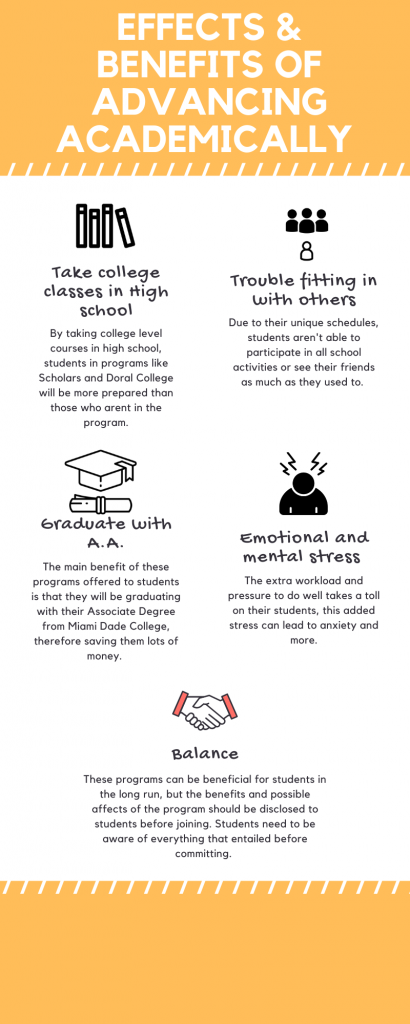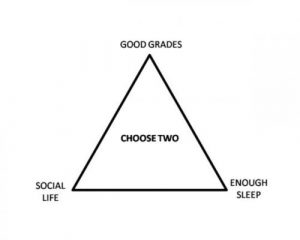High school students such as Alexandra Oruz and Kate Cardona are doing everything possible to assure a successful future. But is all their effort taking a toll on them emotionally and mentally? The pair joined the scholars program at Doral Academy Preparatory at age 15.
“My general knowledge was that I would graduate with my Associate of Arts and take two classes at Miami Dade College,” said Oruz, now a senior. “That was all I knew when I was first told about it.”
On Doral’s website, the scholars program is said to “increase students’ college readiness, allow students to begin their college degree earlier, increase students’ grade point average, and save money towards a college degree.”

To join the scholars program, a student must have a minimum GPA of 3.0 and pass the PERT exam (College Placement Exam). Once in the program, a student cannot receive a “C” or lower, or they will be removed.
One of the main reasons students join is that they get to advance quickly. College credits allow some to save money which can alleviate a family’s financial burden.
“When my daughter told me that she would graduate with her A.A,” says Karla Alvarado, mother of Kate Cardona. “I was so proud and felt a sense of relief, money is a bit tight and this was a guarantee that she would at least receive her A.A. It took two years of college tuition off our backs.”
However, this pressure to succeed can cause more stress. “I’d feel so degraded and disappointed in myself if I dropped out. I don’t want to have wasted a year of commitment to the program,” said Cardona.
When students are approached about joining these special programs, they’re told only of the benefits. Some feel this overwhelming pressure to do well, which affects them socially and emotionally. These students are so focused on doing well and because of their unique schedules. They may not have the same interaction time as other students.
“Scholars has definitely made me feel more like an outcast. I was never one to fit in and so I feel much more isolated and vulnerable compared to regular school, where everyone is spread out and you have a better chance of making friends or feeling comfortable,” said Oruz.
A problem with big schools is that there are so many students and few counselors, so students aren’t provided the right amount of guidance. “No one checks up on us. Our scholars counselor will only call you to her office if you passed with a C, which will end with a warning,” said Oruz.

This can become overwhelming. And with little assistance and nowhere to turn to, they face the tough choice of moving forward or leaving the program altogether.
“I definitely have gone through a period of wanting to give up. You are not guaranteed great professors and being thrown into an environment where I now have to teach myself is an added stress to what I have to deal with in Doral,” said Kate Cardona, a sophomore.
Students need to be able to balance all the different activities they have going on like sports, extracurricular activities, clubs, schoolwork and more. Those in the scholars program have the added work of college courses.
“I left the dual enrollment program. It was too much to take college courses in my own time and manage soccer plus all the homework from dual enrollment and my regular classes,” said Jonathan Hernandez, a junior at Doral.































